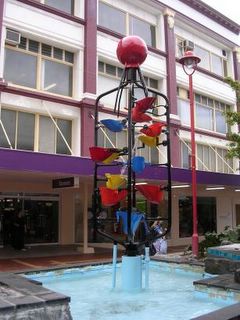Between 9 and 11am on Wednesday, 98mm of rain bucketed down in Tauranga - a one-in-150-years event and more rain than Tauranga usually receives in all of May. This historic deluge brought heartbreak and destruction on a scale no one was prepared for.
9am
Grant Williams tried to dodge the rain as he ran from his house in Welcome Bay to his van in the driveway, lugging paint, brushes and other handyman essentials.
He and wife Robyn had decided to go to Matamata to work on a rental property they own there.
They debated whether they should make the trip because of the rain.
"We were thinking the drive might kill us," Grant recalls.
But the 38-year-old had taken the day off from his job as an Affco salesman especially, so they decided to go. They dropped their daughters, aged 10, 7 and 5, off at Selwyn Ridge School before nipping home to exchange Robyn's Toyota Estima for Grant's Ford work van.
Robyn ran around locking doors and windows and made a quick trip to the loo. She closed the front door of their 6-month-old house, with its spectacular views of green hills and sea, not knowing it would be the last time she saw it whole. She and Grant were on the road by 9.15am.
The Bay of Plenty had awoken to torrential rain on Wednesday morning. Already homes and businesses in Mt Maunganui were flooded and a heavy rain warning was in place. Between 8am and 9am, Tauranga received 36mm of rain - the MetService issues warnings for anything over 6mm an hour.
Keeping stock of the situation was Brian Hodge, group manager of city services at Tauranga District Council or, in layman's terms, the man in charge of the city's stormwater, wastewater, water supply, roads and parks and reserves.
Flash floods had hit Tauranga and the Mount just two weeks earlier. Then, as now, stormwater drains were unable to cope with the volume of rain.
The council rates floods and other civil emergencies on a scale of one to five, level one being the lowest. By level five, a state of emergency is declared. The flooding at Mt Maunganui had prompted a level 2 alert at 8.30am.
Hodge, sitting in his office at the council building in central Tauranga, kept a close eye on reports filtering in from the Fire Service and council staff outside.
"We were aware the situation was becoming worse rather than better."
At 9.30am, as the rain worsened, a level four alert was issued. Hodge's colleague, Alan Pearce, was also monitoring the number of jobs the Fire Service was attending, a key indicator of the seriousness of a weather emergency.
Pearce, training officer for the Western Bay of Plenty emergency management team, knew the situation was bad when he noticed a number of burst septic tanks appear on the log of jobs he was keeping.
Burst tanks indicate large amounts of rain infiltrating the ground.
Pearce knew the time had come to set up the EOC - the emergency operating centre needed for heads of Civil Defence, police, emergency services and local authorities to co-ordinate an emergency response.
He and his team sprang into action, moving computer terminals, projectors, whiteboards and a 2.2m x 4.1m map of the western bay into the circular council chamber room.
10am
Outside, in the streets of the western suburb of Otumoetai, the rain was getting steadily worse.
Builder James King carried loads of timber from his truck to a shop he was doing up on Landscape Rd.
"I was backwards and forwards and I could see the water levels out there were going crazy."
Across the street, he saw a house with water almost up to its windows.
The MetService gauge at Tauranga Airport showed 58mm of rain had fallen since 9am.
Meanwhile, the Fire Service's workload was growing. Calls were coming not just from the Mount but the city and firefighters struggled to keep up. By 10am, they had a backlog of 80 jobs.
Tauranga acting senior station officer Richard Moreland and the crew of four with him in a rescue truck were racing from place to place as fast as they could.
Moreland was conscious of keeping the truck reasonably free in case of a major car crash - a possibility ever more likely with the incessant rain.
His crew were forced to assess the seriousness of each job and move on if necessary, at one point leaving a group of people who had water lapping at their apartment doors.
Moreland says the firefighters installed a pump to drain the water but were unable to stay.
"We all felt really sorry for people. Each person had their own little crisis and was upset."
The ante was upped for emergency services when the first call came of a house being hit by a landslide.
Constable Rick Dent was heading back to Greerton station in the southwest when he heard about it on the police radio.
He turned his patrol car round and headed to Dingadee St in Welcome Bay, in the southeast.
A huge river of mud covering the street signalled he was in the right spot.
People were milling around and a bull mastiff puppy was frolicking in the mess.
"He was loving it, running in and out of the puddles."
Then Dent looked up. The former British Army soldier and United Nations peacekeeper couldn't believe what he saw.
Slammed into the back of one of the houses that had been in the path of the mudslide was an upturned car.
Walking up a steep driveway at the side of the house, he saw another car that had been tossed down the hill by the force of the moving earth.
A huge chunk of the hillside had given way, ramming a phoenix palm through the back bedroom of a house halfway up.
The whole structure was threatening to slide down the hill.
Dent focused on getting the owner, a Scottish artist, out as quickly as he could.
"There's not a lot you can do when nature takes over," he says.
11am
The St John Ambulance area manager for Western Bay of Plenty, Jeremy Gooders, was also moving fast.
Staff in Tauranga asked him to abandon a meeting with St John regional managers in Hamilton, where the clear sky gave no clue of the chaos on the other side of the Kaimais.
"The message was that there was an extremely unusual weather event," Gooders says. Since 10am, another 40mm of rain had fallen.
The Fire Service found itself more and more stretched, nearing a backlog of 200 calls. In Otumoetai, disaster was looming.
The MetService office in Wellington was receiving hourly rainfall readings from the gauge at Tauranga Airport.
But because there is no weather radar in the Bay of Plenty, forecasters had to rely on imperfect computer models to predict what the rain would do next.
Only Auckland, Wellington and Christchurch have weather radar, which allows forecasters to see the exact location, spread and movement of rain to the nearest kilometre.
Computer models are much less sophisticated.
"They're good at picking large-scale events but not so good at picking small-scale events," says severe weather forecaster John Crouch.
And the disaster set to befall Otumoetai was small-scale, at least in terms of its area. All the action happened in three or four short streets.
By 11am, Kris, a drainlayer, was back at the Landscape Rd home he shared with his girlfriend, worried about his house. It had come close to being flooded two weeks ago.
This time the water was worse, flowing fast across the property. "It was a river instead of a lake."
Kris was still at the house, standing by the ranchslider talking to his girlfriend on the phone, when a policeman's home from further up the driveway came hurtling down the hill towards him.
The crumpled wreck came to rest a few metres from where he stood.
Within two hours, the lives of thousands of people had been left at the mercy of Mother Nature and her fury was not about to end. In the 24 hours to 10pm Wednesday, 349mm of rain fell in Tauranga.
Down the coast at Matata, the scene was compared to the Boxing Day tsunami. To witnesses, the damage was gob-smacking. For victims like Grant and Robyn Williams, the aftermath was painful and surreal.
When they returned from Matamata, they found their tidy brick house all but destroyed.
The pink, lime-green and star-filled bedrooms chosen by daughters Alexandra, Brittany and Geena had been smashed to smithereens. Pretty bed covers and ornaments that their mother had worked hard to give them had been lost in a mass of rubble.
Williams' voice cracks as he reflects on his family's chances of survival if they had been home when the earth released its fury.
"We've won Lotto with our lives."









